Report from the Final Workshop of the ENSINOR project
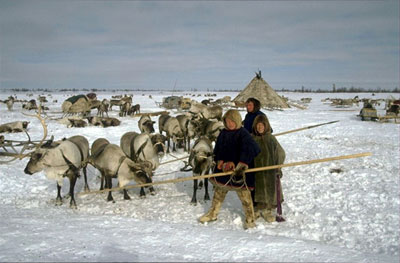 On 10-11 December 2007 the Arctic Centre held a 2-day workshop involving key stakeholders from northern Russia, Finland and Norway. Among the participants were indigenous representatives, oil and gas industry personnel, NGO representatives, government personnel, and a mix of natural and social scientists.
On 10-11 December 2007 the Arctic Centre held a 2-day workshop involving key stakeholders from northern Russia, Finland and Norway. Among the participants were indigenous representatives, oil and gas industry personnel, NGO representatives, government personnel, and a mix of natural and social scientists.
The project has made comparative case studies of oil and gas activities in two key federal districts – the Nenets Autonomous Okrug (NAO) and Yamalo-Nenets Autonomous Okrug (YNAO). Research included environmental impact assessment studies with high resolution satellite imagery, intensive detailed vegetation studies, and long-term anthropological fieldwork with reindeer herders and industry workers studying their interrelations on the oil&gas deposits as well as in towns and cities.
The workshop was the final activity of the 48-month project “Environmental and Social Impacts of Industrialization in Northern Russia (ENSINOR) ”, which was funded by the Academy of Finland January 2004- December 2007.
Results of the project were presented to the key stakeholders
Project researchers Bruce Forbes, Florian Stammler, Timo Kumpula, Tuula Tuisku and Anu Pajunen introduced the key results of the project to the participants. The integrated approach of knowledge co-production in natural science, social science and reindeer nomads’ knowledge was positively received, and local stakeholders expressed their interest in future similar studies on a more extended basis. There is a broad consensus in both regions and expressed will on all sides for a coexistence of industry with indigenous nomadic economies, which should give room for such research and fruitful cooperation of stakeholders.
Research areas are the most productive energy sources in Russia
Nenets Autonomous Okrug and Yamalo-Nenets Autonomous Okrug contain Russia’s most productive proven energy sources for the present and the foreseeable future and so are of particular importance to the energy security of Europe. The extensive gas and oil fields overlap with the homelands of indigenous peoples whose traditional livelihoods – reindeer herding, fishing, hunting and gathering – are at risk from changes in land use associated with petroleum exploration and exploitation, in addition to climate-related changes. As major clients and/or partners of Russian oil and gas, Finland, Norway and other Western European countries have responsibilities to see that the developments proceeds in a manner that minimizes negative impacts in the affected areas.
Reindeer herding is a way to preserve nomandic culture
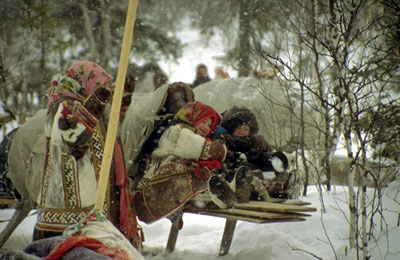 Mikhail Yar, a private Nenets reindeer herder, who originally is from the northern part of the Yamal Peninsula, but now lives and herds with his wife in the Nadymsky region, south of Nadym was one of the presenters and he spoke clearly to the fact the reindeer herding “is a method of preserving the culture” and not only that, but the “nomadic lifestyle is a philosophy” due to the fact their lives were in constant contact with the reindeer in which a unique relationship is forged.
Mikhail Yar, a private Nenets reindeer herder, who originally is from the northern part of the Yamal Peninsula, but now lives and herds with his wife in the Nadymsky region, south of Nadym was one of the presenters and he spoke clearly to the fact the reindeer herding “is a method of preserving the culture” and not only that, but the “nomadic lifestyle is a philosophy” due to the fact their lives were in constant contact with the reindeer in which a unique relationship is forged.
Despite this, there are clashes and misunderstanding which arise from the level of the workers, administrators all the way up to the President. According to Yar, this is because the majority population simply does not understand nor share this philosophy and continually “treat reindeer herders as outsiders”. Yar called for a more “respectful attitude” from the majority population. He said it was inaccurate to state that there was a relationship between reindeer herders and the oil and gas industry and that it would not be possible to talk about one until the attitudes and mindsets of the recent arrivals changed.
Functioning relatioship between herders and industry is possible
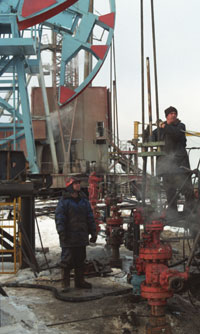 However, evidence from the ENSINOR case study sites in Bovanenkovo (Yamal-Nenets AO) and Varandei (Nenets AO) suggests that the relationship between herders and industry workers is indeed functioning where there is a core of workers with their own history on the tundra ranges. At Bovanenkovo for example, some 600 km north of Yar’s current place of living, the herders of 2 major nomadic camps are in good working relations with the workers that came in the early 1980s to explore the gas field and are still there. As they pass through the field in summer, there is a lively contact going on, with workers visiting camp sites, and herders visiting workers’ facilities, for chatting, trading, and solving problems on the ground. Herders also still work in the velvet antler business, which is now privately run by some of those gas workers who know the families in the tundra best.
However, evidence from the ENSINOR case study sites in Bovanenkovo (Yamal-Nenets AO) and Varandei (Nenets AO) suggests that the relationship between herders and industry workers is indeed functioning where there is a core of workers with their own history on the tundra ranges. At Bovanenkovo for example, some 600 km north of Yar’s current place of living, the herders of 2 major nomadic camps are in good working relations with the workers that came in the early 1980s to explore the gas field and are still there. As they pass through the field in summer, there is a lively contact going on, with workers visiting camp sites, and herders visiting workers’ facilities, for chatting, trading, and solving problems on the ground. Herders also still work in the velvet antler business, which is now privately run by some of those gas workers who know the families in the tundra best.
While Mikhail Yar acknowledged there had been some progress, in his case facts on the ground were different and were entirely dependent on the attitude of certain individuals in certain companies. Development in the Nadym region connected to the oil and gas industry is also different from the case study sites of ENSINOR, since it has been going on since the late 1960s and has meant a loss of pastures and disturbance due to road and pipeline development.
Reindeer herders are on the land "illegally"
Despite being an indigenous inhabitant of the region, Yar reminded the audience that “Reindeer herders do not own the land. We are on the land ‘illegally’”. With that he meant that different from his European Nenets colleagues, in Yamal private reindeer herders do not have land titles so far, as all the pastures are still controlled by the successors of the Soviet State Farms. Yar also sounded a warning that the current trend is away from nomadism and that traditional reindeer husbandry is on the wane wherever it is practiced in Yamal, the Nadym region and the Taimyr region, as a result of this lack of support and respect. “People who settle, and are no longer nomadic or are not connected to reindeer any longer are no longer the ‘keeper of traditions’”. Indeed it makes sense to consider the experience of regions such as Nadym, or the neighbouring Khanty-Mansiisk Autonomous Okrug, where Nomadic mobility has significantly decreased or almost ceased to be practiced. In the North, on the Yamal and Taz Peninsula, however, the number of people and reindeer living on the tundra has been continuously increasing since the 1970s, which has made Yamal the world’s number one reindeer herding region. One of the tasks of the ENSINOR project and the symposium was to contribute to raising awareness, learn from past mistakes and work for a more stable coexistence of both the industrial and the reindeer herding livelihood.
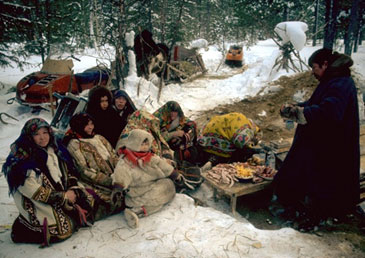 Another reindeer herder, from the Varandei region, Ignatti Vylka is reindeer herder from the ERV cooperative based in Krasnoe spoke of a marked change in attitude and dealings with the oil and gas industry. While there was a very conflictuous time around the turn of the millennium culminating in 2002, some problems were solved in the years to come. Vylka he thought there was a more or less balanced coexistence between herding and industry in the region. This went as far as his colleague Nazar Taleev saying that “it’s more fun to live next to the oil people, although we have many problems” (s neftianikami veselee zhit, khotia problem mnogo’). However, now Vylka thinks that ‘the balance has become very fragile’ (ravnovesie ochen khrupkoe’) and the whole relation could break down any time, due to oil companies pushing forward even more rapidly with development. His region has experienced heavy development with more to come, in particular pipelines and power lines. Most striking was the complete evacuation of a traditional village, Old Varandei in order to make way for the construction of a major seaport and terminal. Nenets fishermen and hunters had settled there and lived off the marine resources on the coast. All of them were relocated to the capital of the region, Naryan Mar, or other places of their choice, but many did not adapt well to the new city environment. Some eventually moved back, either for part of the year or year-round.
Another reindeer herder, from the Varandei region, Ignatti Vylka is reindeer herder from the ERV cooperative based in Krasnoe spoke of a marked change in attitude and dealings with the oil and gas industry. While there was a very conflictuous time around the turn of the millennium culminating in 2002, some problems were solved in the years to come. Vylka he thought there was a more or less balanced coexistence between herding and industry in the region. This went as far as his colleague Nazar Taleev saying that “it’s more fun to live next to the oil people, although we have many problems” (s neftianikami veselee zhit, khotia problem mnogo’). However, now Vylka thinks that ‘the balance has become very fragile’ (ravnovesie ochen khrupkoe’) and the whole relation could break down any time, due to oil companies pushing forward even more rapidly with development. His region has experienced heavy development with more to come, in particular pipelines and power lines. Most striking was the complete evacuation of a traditional village, Old Varandei in order to make way for the construction of a major seaport and terminal. Nenets fishermen and hunters had settled there and lived off the marine resources on the coast. All of them were relocated to the capital of the region, Naryan Mar, or other places of their choice, but many did not adapt well to the new city environment. Some eventually moved back, either for part of the year or year-round.
Pipelines cut reindeer pastures in two
But the main concern of Vylka and his colleagues is the loss of reindeer pastures: “Our reindeer pastures have been cut in two [by pipelines]. We have been told that we should keep reindeer away…The region is of strategic importance to the Nenets Autonomous Okrug and Russia. We feel powerless but we have nowhere to go. They have not offered us replacement land for the land which has been taken away from us…All the details [of industrial development, construction of infrastructure, etc] were hidden from us. There were a lot of subcontractors and it was very unclear [who is responsible for what]..(it was) difficult to find out who signed agreements and who actually did the work and the higher levels of management in Lukoil always blamed the subcontractors (if there were problems)”
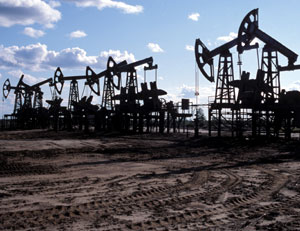 Vylka did acknowledge that there were some benefits associated with the oil and gas development, such as subsidized fuel, the construction of houses for individual herding families (although construction was currently halted) but in the discussion period later, it was clear that there is a long way to go in this relationship as he described how when filming an oil spill with a cell phone (a neat example of independent in situ contemporary environmental monitoring) a colleaugue was roughed up by oil company employees. Ignatii provided a memorable quote in the light of such widespread ecological hazards related to oil and gas development, “After spoiling this earth, are we going to fly to another one?” It is remarkable that such a situation seems to bring herders to the same thought in different regions. Ignatii’s colleague from Yamal, Alexandr Serotetto, had said earlier in 2006 ‘don’t we have only one planet? We should better work to save this one than fly to another one”
Vylka did acknowledge that there were some benefits associated with the oil and gas development, such as subsidized fuel, the construction of houses for individual herding families (although construction was currently halted) but in the discussion period later, it was clear that there is a long way to go in this relationship as he described how when filming an oil spill with a cell phone (a neat example of independent in situ contemporary environmental monitoring) a colleaugue was roughed up by oil company employees. Ignatii provided a memorable quote in the light of such widespread ecological hazards related to oil and gas development, “After spoiling this earth, are we going to fly to another one?” It is remarkable that such a situation seems to bring herders to the same thought in different regions. Ignatii’s colleague from Yamal, Alexandr Serotetto, had said earlier in 2006 ‘don’t we have only one planet? We should better work to save this one than fly to another one”
Alexander Vyucheiski, formerly the vice-Director of the ERV cooperative in NAO, described the process by which Lukoil began in the Varandei region and although it was initially agreed that compensation would be paid the indigenous peoples there were a lot of disagreements and he claimed that they attempted to bribe many reindeer herders to force them to leave the region, in order to open upon the land for development. Repeated administrative disputes and court cases with much interference by local managers and the arrival of new subsidiaries have made the process very complex and difficult to stop. “It is very difficult to negotiate with Lukoil as they pay a lot of money into the local administration and provide a lot of tax revenue”.
Vyucheiski stated that it was often easier to work with one of the many smaller companies in the region with whom joint helicopter travel can be arranged to and from the tundra and they have displayed a greater willingness to negotiate with herder and discuss matter related to compensation. This is largely consistent with findings by the ENSINOR project in both regions, where relations of herders and workers of small industrial units on the ground were found to be much less complicated, there was better knowledge of each other, and mutual understanding, in comparison to difficult negotiations in the city headquarters.
Presentations in the workshop
Other speakers at the symposium included Olga Murashko of RAIPON who discussed the legal framework and possible steps for redress and Konstantin Ochepkov, who discussed the land allocation procedure in Yamal Nenets Autonomous Okrug and how it pertained to reindeer husbandry.
Bruce Forbes (Arctic Centre) pointed out the ‘foot in the door’ process, whereby when permission for development is given, the development ends up being much larger than previously agreed to.
Florian Stammler added that besides significant environmental impacts, cumulative social and cultural consequences of such processes are still mostly underestimated, even though there is a rich pool of existing experiences from which lessons can be learned.
Aitalina Ivanova (Yakutsk State University) brought attendees up to date on the development of the pipeline planned from Siberia to the Pacific. There have been a number of routes proposed, with President Putin even getting involved in route selection when concerns to the damage that might be done to Lake Baikal were raised. A careful consideration of the experiences of Yamal and Nenets AO can be beneficial for Republik of Sakha (Yakutia), which is at very beginning of oil and gas development.
Relating to discussion about sustainable development Anna Stammler-Gossmann remained, that such popular western concepts have in Russia often very different meanings. Under sustainable development some Russian specialists understand first and foremost the rational use of natural resources.
Emma Wilson (International Institute for Environment and Development) spoke of the problematic framework that the oil and gas industry operates within – one that emphasizes deadlines with penalties imposed for delays meaning the timeframes are focused on speed and the cheapest price possible. Wilson called for a reorientation of contracts, where the whole supply-chain of the industry from the head company down to the smallest subcontractor is considered.
A presentation was also made by Mark Nuttall (currently at the University of Oulu), describing the links between the planned Mackenzie Valley pipeline development and the Alberta Tar Sands, the site of a current oil boom in Western Canada with all the energy majors lining up including BP and Statoil (See critical articles in the London Independent on BP’s entry into the tar sand here and Petro Canada are in discussions with Gazprom to swap assets here in order to get a foothold on Yamal, see reindeerblog ). Nuttall overviewed the current negotiation process with First Nations (Dene Cho, Dene Tha through the Joint Review Panel under the National Energy Board, comparing it with the Berger Enquiry of a few decades ago and highlighting the changes since then. Nuttall emphasized for the participants of the symposium that the local and indigenous stakeholders took extensive time and effort to prepare for the negotiations and consultations, unlike situations that happened in Russia where local and indigenous communities were poorly if at all informed and prepared prior to the negotiations. An article in the London based Independent.
Florian Stammler closed the discussion and seminar with an agreement that all parties would develop a document summarizing the findings of the ENSINOR project and outlining future steps that would aid better communication between all parties: reindeer herders, indigenous peoples, administrators and oil and gas officials.
These topics are especially timely, as the Arctic Council will release its first circumpolar “Assessment of Oil & Gas Activities” in January in Tromsø, Norway (Follow link here ).
Contacts for further information on the ENSINOR Project
www.arcticcentre.org/ensinor
Research Professor, Docent Bruce Forbes
E-mail: bruce.forbes (at) lapland.fi
Senior Scientist Florian Stammler
E-mail: florian.stammler (at) ulapland.fi